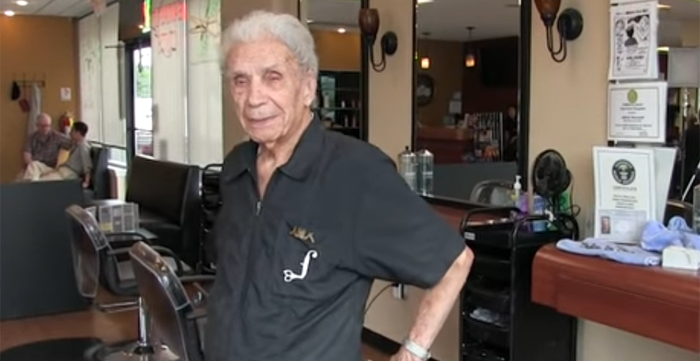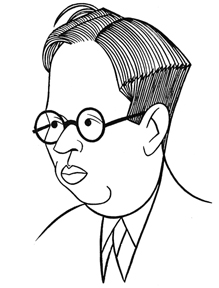Read the story of our first visit with Anthony, in 2012.
Just weeks after finally calling it a career after 96 years of cutting hair, Anythony Mancinelli passed away in his Newburgh, New York, home on September 19, 2019. We will miss him.
It’s been said that if you do what you love, you’ll never work a day in your life.
If that’s so, Anthony Mancinelli, recognized as the world’s oldest barber by the Guinness Book of World Records, has been not-working for the past 95 years.
That’s right, Mancinelli, who turned 107 on March 2, 2018, has been barbering since 1923, when he was just 12 years old. Calvin Coolidge was president, and barbers still offered such services as bloodletting (with leeches), wart removal and cupping. There’s no longer a demand for those services, but Mancinelli still has the tools he used back in the day and he is happy to show them to the curious.
“I used to have a bottle of leeches on my counter, and I would put them on people’s skin to drain blood,” Mancinelli told The New York Times in 2010. “In those days, while giving a haircut, I would put a leech over a black eye to bring down the swelling, or on the arm of someone who had high blood pressure because the thinking was their pressure might drop.”
Mancinelli was born in 1911 near Naples, Italy, and eight years later sailed to the United States with his family, arriving in New York on September 11, 1919. Because an aunt lived there, the Mancinellis settled in Newburgh, New York, just eight miles from New Windsor, where Anthony currently resides.
“This country gave me an opportunity to do everything in life,” said Mancinelli. “It’s up to the [individual] to take up something, to do something to make things better for themselves as well as the country. This country gave me all the opportunities in the world to do it.”
So how did he get into barbering at such a young age?
With his father, a felt worker, supporting a wife, seven sons and a daughter on just $25 a week, young Mancinelli announced that he was going to go out and get a job.
“My father said, ‘What kind of a job are you going to get?’,” said Mancinelli. “‘Well, I’m going to deliver morning papers, then I’ll deliver afternoon papers, then after that, I’ll see if I can get a job to learn the barber business.’
“I went to the one of the barbershops here, and I asked ‘[the owner] if he would teach me the barber business. He said yes, so I stood with him and I learned the barber business… His name was Joseph Turi.
“I don’t know why I chose the barber business, but I thought it was a good profession, so I said, ‘I’ll try it out and see how I like it.'”
In those days, Mancinelli arose at 4 a.m. to deliver the morning paper and then came home for breakfast before heading off to school. After school, he delivered the afternoon paper, after which he would spend a few hours at the barber shop. Finally, at 8 p.m., he would head home, where his mother had an evening meal waiting for him, after which, he said, “I would go right to bed!”
That’s a pretty grueling schedule for anyone, but considering Mancinelli was 12 years old at the time, it’s especially impressive.
Having served an apprenticeship and learned his trade, Mancinelli opened his own shop in 1930; he was just 19 years old.
Read More »


